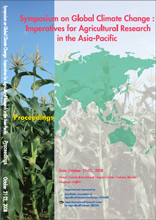Agroforestry and Climate Change: ICRAF’S Research Strategy

Agroforestry Systems for Climate Change Adaptation and Mitigation is one of six global
research projects of the World Agroforestry Centre (ICRAF). The research aims to improve the
resilience of farming systems and livelihood strategies of small holder farmers to current climate
variability as well as long-term climate change, through the increased use of trees for intensification,
diversification and buffering of farming systems. The research focuses on vulnerability assessments,
the impact of climate change on Agroforestry systems, and synergies between climate change
adaptation and mitigation.
Developing countries are going to bear the brunt of climate change and suffer most from its
negative impacts. Mitigation efforts will only provide a partial softening of the effects of climate
change. Local climates and terrestrial ecosystems will change, threatening biota and human
livelihoods. As climate changes, improvements in food security, environmental services and rural
livelihoods are still to be pursued. In many areas, smallholders are pursuing these improvements
through extensification of agriculture rather than intensification. With increasing inter-annual rainfall
variability, cultivation of marginal lands is vulnerable to accelerated rates of degradation of soil and
water resources. Agricultural systems affected by unsustainable management, and land and resource
degradation are the most vulnerable to climate change. Trees have important roles in reducing
vulnerability, increasing resilience of farming systems and buffering households against climate
related risks.
This research project is guided by two central hypotheses:
(1) Trees are deep rooted and have large reserves, and are less susceptible than annual crops to
interannual variability or short-lived extreme events like droughts or floods. Thus, trees offer
diversification options that can reduce production risks for small holder farmers.
(2) Trees are a perennial resource that can be exploited to provide increased income during difficult
periods, thereby reducing income risks associated with climate related shocks for small holder farming
families.
These hypotheses are being evaluated in different landscapes, farming systems and
socio-political contexts to develop knowledge about the potential for trees to help facilitate adaptation,
and to help development agencies create an enabling environment for broader implementation of
Agroforestry to facilitate climate change adaptation.
Through research on the vulnerability and adaptation of Agroforestry systems to climate change,
ICRAF and its partners are analyzing the impacts of climate change on water resources in watersheds,
and developing analytical methods and tools for the management of upland farms in response to
changing climate. This research will help identify climate constraints to the sustainability and
improvement of farm productivity. Enhancing the capacities of national research partners to
conceptualize and implement research on climate change adaptation is a key element of our research.
Given the increasing recognition of the potential role of Agroforestry in addressing vulnerability to
climate change, our research targets the mainstreaming of Agroforestry knowledge in adaptation and
mitigation initiatives in agriculture, environment and forestry, and the scaling-up of Agroforestry
applications to support smallholder adaptation.
There is also great potential for Agroforestry to sequester atmospheric carbon, and thus to
enhance livelihoods while mitigating climate change. Our research is exploring the synergies in
Agroforestry systems between adaptation and mitigation. In the context of REDD discussions at the
UNFCCC, we are developing tools for analyzing the relationships between land use change and
climate change with a specific focus on changes carbon stocks. Given the predicted scale of carbon
markets, World Agroforestry Centre is investing considerable effort in overcoming the main obstacles
to the mobilization of carbon finance to scale up Agroforestry practices that facilitate adaptation to
climate change, by developing tools and methods for measurement and monitoring of the carbon benefits of improved practices in agricultural landscapes, and by supporting institutional innovations
to link small farmers to global carbon markets.
Target regions for mainstreaming knowledge of Agroforestry-based strategies and options
include the arid and semi-arid regions of Africa, typhoon-prone areas in the Philippines, high rainfall
areas in Indonesia and the climate-sensitive Himalayan region. This presentation includes examples of
our research from a range of agroecological settings.
| Date of issued | |
|---|---|
| Creator | Andreas Wilkes |
| Subject |
Agroforestry climate change adaptation mitigation research strategy |
| Publisher | Japan International Research Center for Agricultural Sciences |
| Available Online | |
| Issue | 2008 |
| spage | 156 |
| epage | 163 |
| Rights | Japan International Research Center for Agricultural Sciences |
| Language | eng |
